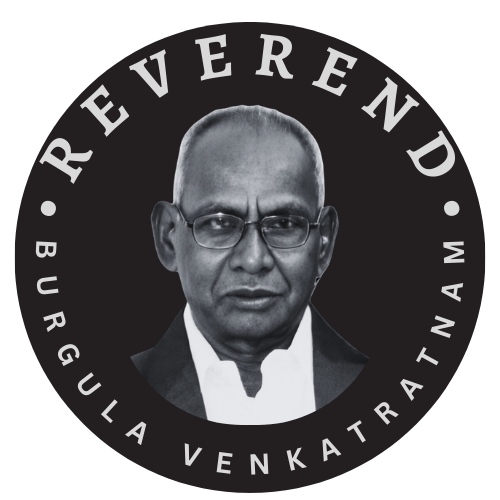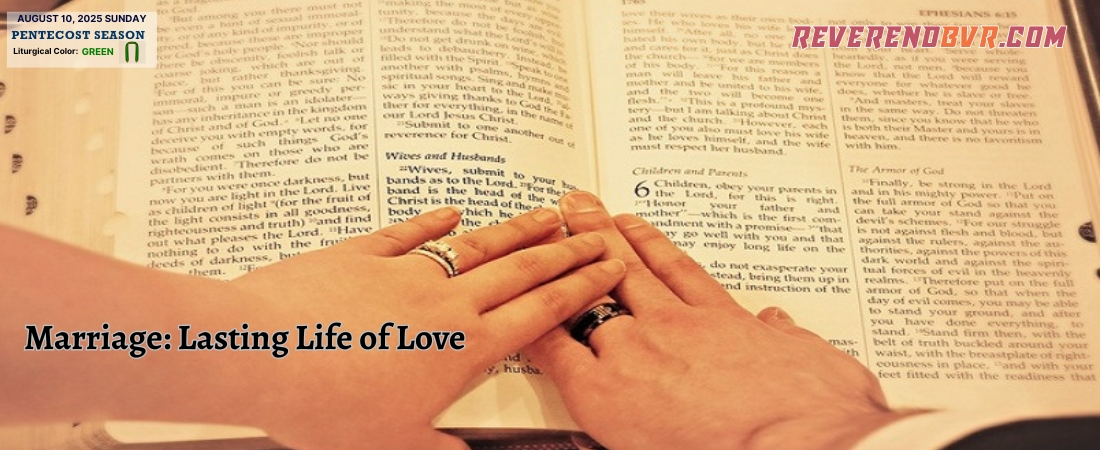Marriage is a sacred covenant woven by God’s own hand—a lifelong union where two souls become one flesh, reflecting the eternal love between Christ and His Church. Though human hearts may falter, this divine bond calls us to love sacrificially, forgive deeply, and uphold faithfulness, embracing God’s vision for lasting love.
Sermon Title: Marriage: Lasting Life of Love -Understanding the Biblical and Theological Foundations of Marriage, Divorce, and Remarriage
Date: Sunday, August 10, 2025.
Readings: Genesis 29:1-20 | Psalm 128 | Hebrews 13:1-6 | Matthew 19:3-9.
Original Language Reflections (For deeper study, see Section 8 in the sermon): Refer Table explaining Hebrew & Greek Words.
Website: www.reverendbvr.com
Introduction: A Divine Institution and Human Reality
Marriage, within the Judeo-Christian tradition, is not merely a human institution; it is a sacred covenant established by God at the dawn of creation. The Bible opens with a divine declaration in Genesis 2:24: “For this reason a man will leave his father and mother and be united to his wife, and they will become one flesh.” This profound statement reflects the heart of God’s design for human flourishing—a union of love, unity, and mutual support.
In this sermon, we will explore marriage not only as a social contract but as a reflection of divine will and purpose. We will delve into the theological foundations found in Scripture, examining both the beautiful ideal and the sobering reality of marital life, including the difficult topics of divorce and remarriage, drawing on Genesis 29:1-20, Psalm 128, Hebrews 13:1-6, and Matthew 19:3-9. We will seek to understand marriage as a divine gift, yet one that requires sacrifice, commitment, and, at times, forgiveness.
1. The Origin and Purpose of Marriage (Genesis 29:1-20)
In Genesis 29:1-20, we find the story of Jacob’s journey to Paddan Aram and his meeting with Rachel. This passage is significant not only for the narrative of Jacob’s love for Rachel but also because it highlights the importance of divine providence and covenantal commitment. Jacob’s actions reflect the deep personal and spiritual nature of marriage—Jacob goes so far as to work for seven years, enduring hardship out of his love for Rachel.
The Hebrew word “kâlâh” (כָּלָה), which refers to the bride, carries with it the notion of completion and fulfillment—marriage is seen not simply as a social arrangement but as a fulfillment of God’s intended design for human relationships. This idea is further confirmed in Genesis 2:24, where the act of a man leaving his parents to be united with his wife signifies an indissoluble bond—one that is both physical and spiritual.
The use of the word “dabaq” (דָּבַק) in Genesis 2:24 conveys the concept of clinging or sticking to one’s spouse, highlighting the permanence and sacredness of this bond. In the biblical view, marriage is not a transient or temporary institution but an enduring covenant that mirrors God’s covenant with His people.
2. Marriage: A Sacred and Lifelong Commitment (Matthew 19:3-9, Ephesians 5:31-32)
In the Gospel of Matthew 19:3-9, Jesus addresses the issue of divorce, reaffirming the divine intent for marriage. The Pharisees question Jesus about the legality of divorce, and He responds by pointing back to the creation narrative:
“Haven’t you read,” he replied, “that at the beginning the Creator ‘made them male and female,’ and said, ‘For this reason a man will leave his father and mother and be united to his wife, and the two will become one flesh’?” (Matthew 19:4-5).
Jesus’ teaching on marriage emphasizes the indissolubility of the marital bond. He explains that divorce is not part of God’s original plan, but a concession allowed by Moses due to the hardness of human hearts (Matthew 19:8).
Here, the Greek word “sunzeugnumi” (συνζεύγνυμι), which means “to yoke together” or “to bind together,” emphasizes that marriage is a divine act, where God Himself unites two individuals. No human authority has the right to sever what God has joined. This understanding reflects the high ethical and theological vision of marriage in Scripture, one that transcends individual desires or societal norms.
Paul in Ephesians 5:31-32 further elucidates the sacredness of marriage, describing it as a mystery that reflects the relationship between Christ and the Church. Here, the Greek word “mystērion” (μυστήριον) implies that marriage is not only an earthly institution but a divine symbol of the ultimate union between Christ and His bride, the Church. Thus, marriage is meant to reflect sacrificial love, unity, and the eternal covenant of God.
3. Divorce: A Biblical Perspective on Its Permissibility (Matthew 19:9, Mark 10:9)
While the Bible presents marriage as an unbreakable covenant, it also acknowledges the tragic reality of human brokenness. In Matthew 19:9, Jesus provides the exception clause for divorce: “And I tell you that anyone who divorces his wife, except for sexual immorality, and marries another woman commits adultery.”
The Greek term “porneia” (πορνεία) refers to sexual immorality, encompassing various forms of sexual sin, including adultery. Jesus’ words suggest that divorce is permissible only in cases of sexual unfaithfulness. This recognition of human fallibility does not annul the sacred nature of marriage but allows for the painful reality of its dissolution under extreme circumstances.
Theologically, divorce in cases of adultery is seen as a breach of the marital covenant so severe that it destroys the foundational trust and unity that marriage is meant to foster. As John Piper notes, while divorce is allowed in these cases, it is still a tragedy in God’s eyes, and reconciliation should always be the goal.
4. Remarriage: The Importance of Covenant Fidelity (Matthew 5:32, Romans 7:3)
Jesus’ teaching in Matthew 5:32 is particularly striking when it comes to remarriage after divorce: “But I say to you that anyone who divorces his wife, except for the reason of unchastity, makes her commit adultery; and whoever marries a divorced woman commits adultery.”
Here, Jesus stresses that remarriage after an unlawful divorce is considered adultery. This aligns with the high standards set forth in the Old Testament for marital fidelity. Romans 7:3 affirms that remarriage is only permissible after the death of a spouse or in cases where the divorce was biblically justified.
In 1 Corinthians 7:10-11, Paul echoes this sentiment, noting that remarriage is allowed only in cases where the marriage covenant has been rightly dissolved.
5. The Role of Love in Marriage: A Lasting and Sacrificial Union (1 Corinthians 13:4-7, Ephesians 5:25-28)
The foundation of a lasting and successful marriage is agape love—the selfless, sacrificial love that Christ demonstrates toward the Church. As Paul writes in 1 Corinthians 13:4-7, this love is patient, kind, and forgiving. It endures hardship and seeks unity.
In Ephesians 5:25-28, Paul exhorts husbands to love their wives as Christ loved the Church—sacrificially, with a love that gives without expecting anything in return. This is the ideal for Christian marriages: a relationship built on the love of God, reflective of Christ’s love for His people.
6. Conclusion: Embracing the Divine Vision of Marriage
Marriage, as outlined in Scripture, is a divine covenant that reflects God’s eternal love and commitment to His people. It is a sacred bond meant to last a lifetime, grounded in love, sacrifice, and mutual respect. While divorce may be permitted in cases of sexual immorality, it should never be viewed as the ideal, and remarriage should be approached with caution, only in cases where the divorce was biblically justified.
May each marriage reflect the divine love between Christ and His Church, and may we all seek to live out this sacred calling with humility, faith, and grace.
7. Closing Prayer:
Heavenly Father,
We thank You for the sacred institution of marriage, which reflects Your eternal covenant with Your people. We pray that You would strengthen the marriages in our community, enabling them to endure with sacrificial love and commitment. Heal those who are struggling with broken relationships, and guide those facing difficult decisions regarding divorce and remarriage. May our marriages honor You, reflect Your love, and be a testimony of Your grace.
In Jesus’ name, Amen.
8. Learn Words from the Original Scriptures (For deeper understanding and meditation on today’s theme)
| S.No | Word /Term – Click on each term to view its lexical details | Language | Meaning/Context |
| 1. | kâlâh (כָּלָה) | Hebrew | Refers to the bride, carrying the notion of completion and fulfillment. |
| 2. | dabaq (דָּבַק) | Hebrew | Means to cling or stick, emphasizing the permanence and sacredness of the marital bond. |
| 3. | sunzeugnumi (συνζεύγνυμι) | Greek | Means “to yoke together” or “to bind together,” referring to the divine act of uniting two individuals. |
| 4. | mystērion (μυστήριον) | Greek | Refers to a mystery, describing the relationship between Christ and the Church, symbolized in marriage. |
| 5. | porneia (πορνεία) | Greek | Refers to sexual immorality, encompassing various forms of sexual sin, including adultery. |
9. Bibliography:
- Bonhoeffer, Dietrich. Life Together: The Classic Exploration of Christian Community. HarperOne, 2009.
- Piper, John. This Momentary Marriage: A Parable of Permanence. Crossway, 2009.
- Wright, N.T. Paul for Everyone: The Prison Letters. SPCK, 2004.
- Stott, John. The Cross of Christ. InterVarsity Press, 1986.
- BDAG. The Greek-English Lexicon of the New Testament.
© 2025 ReverendBVR.com | High-Academic Sermon Series, 2025.
Content licensed under Creative Commons Attribution-NonCommercial-NoDerivatives 4.0 International (CC BY-NC-ND 4.0). You are free to share — copy and redistribute the material in any medium or format with proper attribution. No commercial use or modifications allowed without explicit permission.
For further sermons and biblical reflections, please visit 🌐 www.reverendbvr.com/sermons

